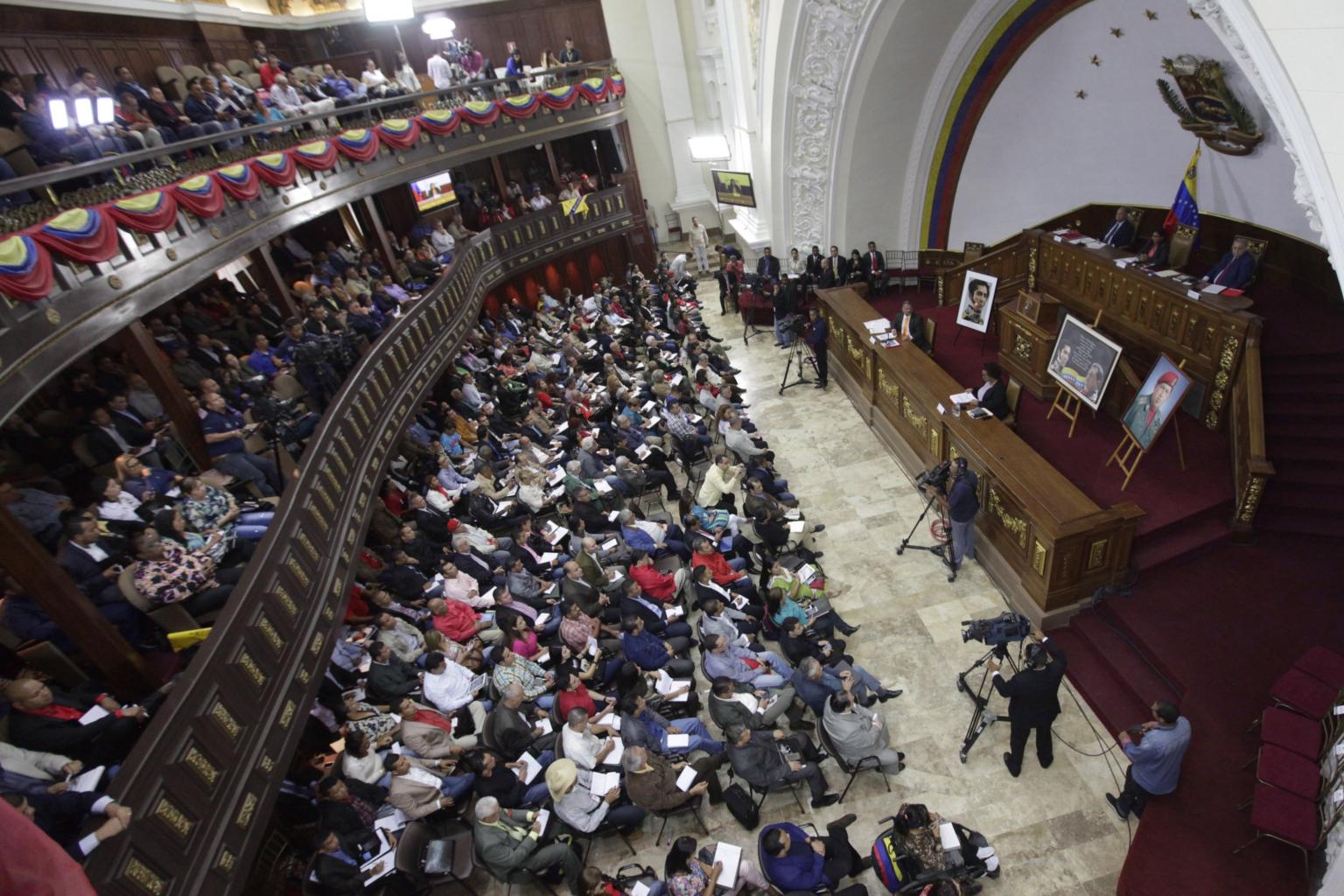Venezuela government allies seize legislative powers
Sign up now: Get ST's newsletters delivered to your inbox

A handout photograph made available by Agencia Venezolana de Noticia (AVN) shows a hearing of the Constituent National Assembly in Caracas, Venezuela, on Aug 18, 2017.
PHOTO: EPA
CARACAS (AFP) - Venezuela's new pro-government constitutional authority declared on Friday (Aug 18) it was seizing power from the opposition-led legislature, tightening President Nicolas Maduro's grip on the country in defiance of international outrage.
It was the latest manoeuvre in a deadly political crisis that has seen Maduro branded a dictator by opponents, whom he in turn accuses of plotting with the United States to overthrow him.
The Constituent Assembly unanimously adopted a decree authorising it to "take over functions to legislate on matters directly concerned with ensuring peace, security, sovereignty, the socio-economic and financial systems, state assets and upholding Venezuelans' rights".
The opposition-led National Assembly rejected the move.
"The NCA is null and its acts are illegal and unconstitutional," the body said on its official Twitter account, referring to the new National Constituent Assembly, which is an elected temporary Parliament that has the mandate to draft or reform the Constitution.
Supreme public power
The centre-right opposition says the new constituent assembly is a ploy by Maduro to tighten his grip on power.
It was ostensibly set up to rewrite the Constitution but has been handed sweeping powers to override all other branches of government.
"All the organs of public power are subordinate to the National Constituent Assembly," said the decree, read out at Friday's session.
The body's 545 members, all Maduro allies, were elected on July 30 in polls marred by violence and allegations of fraud.
"We will not permit any more diverting of power" by the opposition, said the assembly's president, Maduro's former foreign minister Delcy Rodriguez.
"The Constituent Assembly is here to impose order."
One of the assembly's first moves after being elected was to fire the country's attorney general Luisa Ortega, who had become Maduro's most senior critic.
She hit back on Friday by claiming she had evidence implicating Maduro and his inner circle in an international bribery scandal involving Brazilian construction firm Odebrecht.
"They are very worried and anxious, because they know we have details on all the cooperation, amounts and people who got rich, and that investigation involves Mr Nicolas Maduro and his inner circle," Ortega told a meeting of Latin American prosecutors in Mexico by video conference.
Ortega and her husband German Ferrer, a prominent lawmaker who faced an arrest warrant at home, turned up later on Friday in Colombia, immigration officials there said.
These officials did not specify what immigration status the couple had or if they are seeking protection from the government of Colombia, which has joined other countries in slamming Maduro as trying to crush democracy in his country.
International concern
The United States, which has imposed direct sanctions on Maduro, accused his regime of a "power grab... designed to supplant the democratically-elected National Assembly with an authoritarian committee operating above the law".
"As long as the Maduro regime continues to conduct itself as an authoritarian dictatorship, we are prepared to bring the full weight of American economic and diplomatic power to bear in support of the Venezuelan people as they seek to restore their democracy," the State Department said in a statement.
US President Donald Trump warned a week ago that that he was considering various options to resolve the Venezuela crisis, "including a possible military option if necessary".
But his Vice-President Mike Pence softened that stance this week during a tour of Latin American countries, saying he was sure democracy could be restored through economic and diplomatic pressure.
One of Maduro's fiercest international critics, the leader of the Organisation of American States, Luis Almagro, called for a special meeting of the body in response to the "fraudulent dissolution" of the legislature.
Venezuela's socialist leader was elected in 2013, but is facing calls to quit from opponents angry at an economic crisis that is causing hunger and deadly violence.
Nearly 130 people have been killed this year in a wave of anti-government protests.
The legislature, controlled by the opposition since late 2015, was the last state institution still not held by Maduro's allies.


